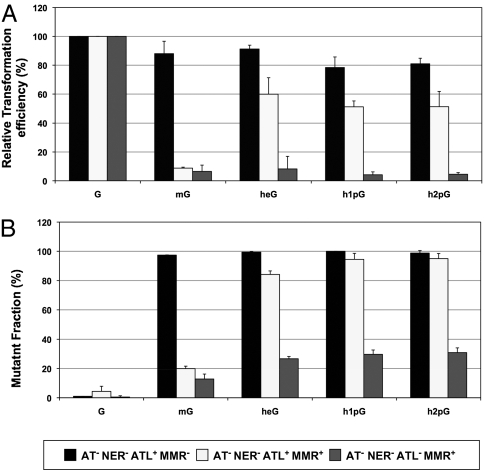Fig. 2.
eATL protects O6-alkylguanine:T mispairs from MMR-mediated toxic processing. Single-stranded plasmid vectors carrying a single O6-alkylguanine adduct were introduced into various E. coli strains by transformation. All strains used are defective in both AT (ada, ogt) and NER (uvrA) repair and additionally carry a mutation in mutS (MMR−) or ybaZ (ATL−). (A) The RTE is determined as the efficiency of the single-stranded plasmid carrying a given adduct to form colonies on ampicillin plates over the efficiency of the same quantity of lesion-free control construct. In an MMR− strain, all adducts exhibit an RTE of ≈80%, illustrating the low replication-hindering capacity of these adducts. In an MMR-proficient strain, survival of the mG adduct is strongly reduced (<10%), whereas it remains high for all other adducts (50–60%). Interestingly, inactivation of ybaZ (ATL−) strain strongly sensitizes all adducts to levels < 10%. It can thus be concluded that eATL efficiently protects all adducts (except mG) from the attack by MMR of the O6-alkylguanine:T replication intermediate. (B) Determination of the mutant fraction induced by the O6-alkylguanine adducts as described in Materials and Methods. In an MMR-defective background, all adducts exhibit mutant fractions close to 100%. When MMR processing is proficient (AT−NER−ATL+MMR+), the mutant fraction is strongly decreased for mG but not for the other adducts. Further inactivation of eATL sensitizes all adducts to MMR (AT−NER−ATL−MMR+).

